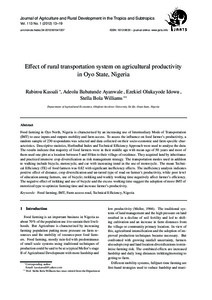Aufsatz

Effect of rural transportation system on agricultural productivity in Oyo State, Nigeria
Abstract
Food farming in Oyo North, Nigeria is characterised by an increasing use of Intermediary Mode of Transportation (IMT) to ease inputs and outputs mobility and farm access. To assess the influence on food farmer’s productivity, a random sample of 230 respondents was selected and data collected on their socio-economic and farm specific characteristics. Descriptive statistics, Herfindhal Index and Technical Efficiency Approach were used to analyse the data. The results indicate that majority of food farmers were in their middle age with mean age of 50 years and most of them used one plot at a location between 5 and 10km to their village of residence. They acquired land by inheritance and practiced intensive crop diversification as risk management strategy. The transportation modes used in addition to walking include bicycle, motorcycle, and car with increasing trend in the use of motorcycle. The mean Technical Efficiency (TE) of food farmers was 0.82 with significant inefficiency effects. The inefficiency analysis indicates positive effect of distance, crop diversification and un-tarred type of road on farmer’s productivity, while poor level of education among farmers, use of bicycle; trekking and weekly working time negatively affect farmer’s efficiency. The negative effect of trekking and use of bicycle and the excess working time suggest the adoption of more IMT of motorized type to optimize farming time and increase farmer’s productivity.
Citation
In: Journal of Agriculture and Rural Development in the Tropics and Subtropics. Kassel : Kassel University Press. - Vol. 113, No. 1 (2012), S. 13-19Collections
Vol 113, No 1 (2012) (Journal of Agriculture and Rural Development in the Tropics and Subtropics (JARTS))Citation
@article{urn:nbn:de:hebis:34-2012061541307,
author={Kassali, Rabirou and Ayanwale, Adeolu Babatunde and Idowu, Ezekiel Olukayode and Williams, Stella Bola},
title={Effect of rural transportation system on agricultural productivity in Oyo State, Nigeria},
year={2012}
}
0500 Oax 0501 Text $btxt$2rdacontent 0502 Computermedien $bc$2rdacarrier 1100 2012$n2012 1500 1/eng 2050 ##0##urn:nbn:de:hebis:34-2012061541307 3000 Kassali, Rabirou 3010 Ayanwale, Adeolu Babatunde 3010 Idowu, Ezekiel Olukayode 3010 Williams, Stella Bola 4000 Effect of rural transportation system on agricultural productivity in Oyo State, Nigeria / Kassali, Rabirou 4030 4060 Online-Ressource 4085 ##0##=u http://nbn-resolving.de/urn:nbn:de:hebis:34-2012061541307=x R 4204 \$dAufsatz 4170 7136 ##0##urn:nbn:de:hebis:34-2012061541307
<resource xsi:schemaLocation="http://datacite.org/schema/kernel-2.2 http://schema.datacite.org/meta/kernel-2.2/metadata.xsd"> 2012-09-24T11:03:45Z 2012-09-24T11:03:45Z 2012 1612-9830 urn:nbn:de:hebis:34-2012061541307 http://hdl.handle.net/123456789/2012061541307 eng Kassel University Press Urheberrechtlich geschützt https://rightsstatements.org/page/InC/1.0/ Food farming IMT Farm access road Technical Efficiency Nigeria 630 Effect of rural transportation system on agricultural productivity in Oyo State, Nigeria Aufsatz Food farming in Oyo North, Nigeria is characterised by an increasing use of Intermediary Mode of Transportation (IMT) to ease inputs and outputs mobility and farm access. To assess the influence on food farmer’s productivity, a random sample of 230 respondents was selected and data collected on their socio-economic and farm specific characteristics. Descriptive statistics, Herfindhal Index and Technical Efficiency Approach were used to analyse the data. The results indicate that majority of food farmers were in their middle age with mean age of 50 years and most of them used one plot at a location between 5 and 10km to their village of residence. They acquired land by inheritance and practiced intensive crop diversification as risk management strategy. The transportation modes used in addition to walking include bicycle, motorcycle, and car with increasing trend in the use of motorcycle. The mean Technical Efficiency (TE) of food farmers was 0.82 with significant inefficiency effects. The inefficiency analysis indicates positive effect of distance, crop diversification and un-tarred type of road on farmer’s productivity, while poor level of education among farmers, use of bicycle; trekking and weekly working time negatively affect farmer’s efficiency. The negative effect of trekking and use of bicycle and the excess working time suggest the adoption of more IMT of motorized type to optimize farming time and increase farmer’s productivity. open access In: Journal of Agriculture and Rural Development in the Tropics and Subtropics. Kassel : Kassel University Press. - Vol. 113, No. 1 (2012), S. 13-19 Kassali, Rabirou Ayanwale, Adeolu Babatunde Idowu, Ezekiel Olukayode Williams, Stella Bola Gedruckte Ausg. im Verlag Kassel Univ. Press (www.upress.uni-kassel.de) erschienen. </resource>
The following license files are associated with this item:
Urheberrechtlich geschützt

